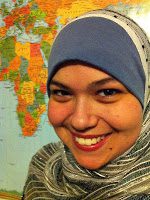 How do the siblings of individuals with autism cope with the spectrum disorder’s grip on their lives? When so much of a family’s life revolves around the child with ASD, how do siblings feel about it all — the questions from friends, having to leave parties early and a thousand other things? How do you handle going to the mosque when half of your family never comes because your brother cannot handle it and the community isn’t the most welcoming? I wonder what my own two younger children feel in what they witness and deal with with their older brother, Lil D. Safaya Fawzi, whose brother has autism, writes a moving post here from a sibling’s perspective on it all.
How do the siblings of individuals with autism cope with the spectrum disorder’s grip on their lives? When so much of a family’s life revolves around the child with ASD, how do siblings feel about it all — the questions from friends, having to leave parties early and a thousand other things? How do you handle going to the mosque when half of your family never comes because your brother cannot handle it and the community isn’t the most welcoming? I wonder what my own two younger children feel in what they witness and deal with with their older brother, Lil D. Safaya Fawzi, whose brother has autism, writes a moving post here from a sibling’s perspective on it all.
By Safaya Fawzi
Usually it was just a get-together between families for dinner, dessert, and evening prayers. Sometimes it was iftar, or a picnic at a nearby park, or an Eid party.
These quite regular experiences were probably somewhat fun for most kids my age, even if they were noisy and overwhelming sometimes: the moms chattering and scolding and kissing their kids, the dads laughing uproariously every few minutes, the kids screaming and laughing and playing random made-up games. But I dreaded these get-togethers for most of my childhood. I would go off to play with my friends, only for a disruption to ruin my fun and force me to leave the board game or the movie or the joke-telling early: “Safaya, we have to go, we need to get your brother home.” “Safaya, come on, your brother’s getting agitated.” And the worst ones were when I was called from the top of the basement (because us kids were always in the basement): “Safaya, COME.”
My brother has an autism spectrum disorder. Autism is, for many, a disability, because it often prevents typical communication, acceptance, and interaction when engaging with others (yes, yes, the real disability is society, but for the sake of this article, my brother is the one with the label–labeling society becomes much more pervasive). Autism is considered to be a “spectrum,” party because no person’s autism is the same as another’s. My brother looks like any other kid, but he repeats questions, has ADHD symptoms, and has highly specialized and select interest and knowledge in almost everything movies (not just “oh-yeah!-I’ve-heard-of-that-famous-director-once” knowledge. More like “the-credits-rolling-at-the-end-of-the-movie-when-everyone-leaves-the-theater-except-him” knowledge).
It’s not just my brother’s overwhelming expertise in movie trivia that separates him from many other kids. My brother struggles with social interactions and intuitive social cues (though he is highly verbal) that most of us take for granted. He never said “Asalamu Alaikum” back to the inquisitive (which I use as a polite word for “generally disapproving”) adults at all these dinner parties. He noticed as he got a bit older that all the other boys his age were playing with their friends, throwing around soccer balls or basketballs, talking about videogames, and going to the “dads’” food line when dinner came around.
Half the time after ringing the doorbell, we would walk in as a family, but he would march straight up to the TV, fiddle with the electronics, and suddenly, Family Z’s collection of R-rated movies would be on loop, loudly. I learned to cringe internally and run to the basement as soon as I said my salaams to avoid the embarrassment of the high volume TV that would inevitably be turned on.
This stuff was sort of okay when he was very young, but as my brother grew a bit older, and we struggled more and more to explain concepts like God, shahada and Islamic history, he became more and more resistant. He didn’t understand how there could even be a God, and how He could have no beginning and no end. The instinct to quote the Quran was not very helpful in this instance. Since I wasn’t much older than him, I had trouble explaining, too. I mean, isn’t that what faith is? Much of it isn’t supposed to be fathomable and explainable, right?
While these conversations with my brother helped remind me why I should believe in God, I still struggled with the fact that my brother didn’t believe. Half of my family was rarely at the mosque, because my brother didn’t know how to pray, and couldn’t be left home alone. After the 20th mosque visit where I was the only one from my family in the women’s section, I started collecting a mental database of all the passed-on salaams.
Most people stopped asking where the other half of my family was and just knew they weren’t coming. But there were always a few people who would probe and prod. These questions forced me to think about things that my friends with their sprawling families and their mosque as their “home away from home” didn’t have to think about, and it made me feel very separated from my community:
“But where is your mother?” (Woman #1 peers around the prayer area)
“But why isn’t she here?” (Woman #2 scopes out the mosque lobby)
“How is your family???” (Woman #237; at this point, just an uncomfortable look, waiting for my answer)
Where to start? How to explain?
My attitude was that of one trying to hide my pain at feeling not fully accepted. My family was divided and different, which are two rock-solid barriers to feeling accepted in most Muslim communities. After giving some mumbled excuse, I would think to myself:
Not every girl’s mom has to come with her to the mosque! (Defensive)
So what if no Muslims near us understood autism, or thought my brother wasn’t raised well or was some aimless misfit? (Angry)
I can guard my brother without anyone else’s help. (Alone)
I don’t often think about this part of my childhood, because it was so frustrating. But I do sometimes I think back to my 10-year old self and want to sit her down and tell her that she shouldn’t be defensive, she shouldn’t be angry, and that she wasn’t alone (God was–and always is–right there!). Instead, she should have focused on the positive and how I could both learn from my experience and share with others.
Because when I think about the impact my brother has had on me, it is unbelievable: he has taught me patience and kindness and love; things that I thought he prevented me from having when I felt that I couldn’t get those things from my Muslim community and friends who didn’t even know about my experiences, and with whom I struggled to share my story.
I also realized that there is not, nor should there be, a set trajectory that every “good Muslimah” or “ideal Muslim family” should follow or be like. I was wallowing in self-pity throughout my childhood when I should have worked to gain strength from the difference that my family embodied. Rather than isolate myself, I now try to work with what God has given me, even if it may seem challenging and I might want to retreat and avoid those difficult questions like I learned to do when I was fleeing the women’s shoes section to avoid those other difficult questions.
 And another thing: the Muslim community has really stepped it up and I feel so embraced, as a person who identifies as big sis to a brother with autism (I thought I was the only one in the universe–another one of the perils of self-pity). Writers like Dilshad Ali at Patheos, ISNA sessions have included Muslim speakers specializing in disability, mental health, and has sponsored a helpful handout for all Muslims to learn how mosques can improve social and physical acceptance and access for people with disabilities, and a powerful organization that works domestically and abroad called EquallyAble was founded by a Muslim and works with Muslims with disabilities worldwide. (Here’s a brochure you can provide to your khateeb so they can have a disability-friendly khutbah that shows that Muslims from all family backgrounds and abilities are welcome at the mosque!)
And another thing: the Muslim community has really stepped it up and I feel so embraced, as a person who identifies as big sis to a brother with autism (I thought I was the only one in the universe–another one of the perils of self-pity). Writers like Dilshad Ali at Patheos, ISNA sessions have included Muslim speakers specializing in disability, mental health, and has sponsored a helpful handout for all Muslims to learn how mosques can improve social and physical acceptance and access for people with disabilities, and a powerful organization that works domestically and abroad called EquallyAble was founded by a Muslim and works with Muslims with disabilities worldwide. (Here’s a brochure you can provide to your khateeb so they can have a disability-friendly khutbah that shows that Muslims from all family backgrounds and abilities are welcome at the mosque!)
Safaya Fawzi is a rising senior at Wellesley College and a monthly columnist at Comingoffaith.com, where this piece was originally published. and she knows she probably wants to save the world but has basically no idea how to do that so she’s thinking maybe that goal is a bit misguided but she doesn’t want to exclude any options by focusing on something so here she is writing run-on sentences with no punctuation even though she’s a grammar nerd. Seriously, though, she is really excited about this blog and its potential to open people’s minds, including and especially her own. Follow her on twitter.












